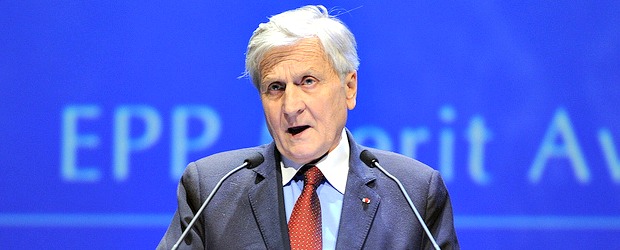You have no items in your cart. Want to get some nice things?
Go shopping
In an interview with the French Europe 1 radio station, former ECB President Jean-Claude Trichet gives his view of the economic crisis in Europe, particularly its southern, Mediterranean countries. The interview is transmitted early on Sunday morning, you listen to Trichet’s analysis with a certain interest and measure of unhurried concentration. His core argument can be summed up in two or three basic sentences.
The roots of the present crisis are in highly exaggerated public spending, with ensuing high debt levels and national budget deficits. When the rest of the world won’t continue to finance the deficits of the indebted countries, these have to regain their stability or balance progressively, by systematically cutting their expenses. They have to implement reforms and maintain austerity efforts to regain the confidence of the investors, without the actual rates of margin that less indebted countries can allow themselves. The interviewer asks Trichet if these politics haven’t led to an impoverishment of the broader populations in the South, through no real fault of their own, and Trichet admits this in part: it’s the leaders, not the citizens at large who are to blame for the erroneous decisions. But we have to remember that, as these countries have behaved badly in the past, their citizens too have enjoyed the advantages of the short-term benefits produced; so it’s only natural that they pay back what at an earlier stage they received.
Trichet takes the example of Germany, who in the 1990’s, due to its weak economy earned itself a name as “the sick man of Europe.” Germany wasn’t sick but potentially sound, through its reforms and severe saving measures laying the foundations of its future growth. It took Germany 10 years of struggling to recover economically, but now its unemployment is marginal and its financial basis solid. Here the interviewer points out that much of the labor-market recovery has come in terms of “minijobs” and near-minimum-wage employments which have aggravated the conditions of the working force, but Trichet dismisses this: mass unemployment, in creating inequality, lack of social cohesion and high rates of criminality, is the worst possible perspective, any measure that avoids it must be considered a success. And this is basically what Germany through its austerity has achieved; now the other, southern countries are in line.
Trichet’s narrative is seducingly simple and intelligible, you find yourself intuitively disposed or even eager to accept it. The high-debt countries spend too much, their welfare bills surpass the Germans’ to considerable degrees (in the case of France specifically: by 10%). Their economies show very little flexibility (labor agreements and protection are too generous); their “competitivity” is low (production costs and wages are too high). For years and years Germany battled to reduce these same defects, saving while other countries overspent. It’s comfortable to think that now the Germans prosper while the others pay the prize for their transgressions. Your moral attitudes are flattered by this reassuring truth. But as the morning passes on and you reluctantly wake up the thinking self inside of you starts to react.
For if it’s true that Germany by now has durably recovered – not just transferred its previous debt into a massive, concealed poverty among its broader ranks, but reached a state of healthy economic growth – if this is true, then by what means did it achieve it? By its exports, it would seem. And the ones who did a grand part of the buying, who were they? The southern European countries obviously. Wasn’t it Germany encouraging its neighbors from the South to spend more money, take more loans (from German banks, preferably, not always necessarily at favorable overall conditions), to invest freely in all kinds of enterprises, sane or not, which would increase the slow demand for German products, new equipment and supplies, providing orders for its industry and growing, lucrative markets. It was like this – by purposely provoking just the kind of reckless, immeasurably puffed up, slack economic behavior which they now accuse the southern countries of – more than anything, like this Germany overcame the crisis it had gladly caused itself while financing its unification. Instead of paying back the favor, what it asks its neighbors now are sacrifices which will serve to help sustain its proper exports, first of all, and something more. It inexorably demands to get the loans paid back in full, meaning the southern countries end up paying doubly for its wealth, once by buying and investing in its goods, opening markets, once the interest exacted to afford such deals at all. Without vast loans the southern countries never could have entered in; and so the narrative Trichet sells proves a huge and ugly myth.
This is revolting in itself, and even more so when you think that, since you realize these facts, Trichet must realize them too. And since he does, what you conclude is that he’s consciously dishonest. So then the next thing you’ll be asking is, whose interests does he run (except, in a secondary sense, likely his own)? What are his motives, what is driving him to act the way he does? You take a look at the statistics and you learn that, once again, whereas the wages and conditions of the workers have gone down, whereas the crisis makes its victims by the millions companies of every order boost their profits on and on, from year to year – and money doesn’t disappear, we know, but merely changes hands. The benefits that are produced have to exist, they must be somewhere. Trichet is cheating, he’s a liar, but no major driving force: he seems to carry out a scheme of larger scope that lies beneath, on account of some vague forces that we’re not able to name, in command of what is basically an ideological-economic war.

About Arndt Britschgi
Born and raised in Finland, Arndt Britschgi spent the best part of his life in Madrid, Spain, and in 2006 completed his Ph.D. in Philosophy from the University of Zurich, Switzerland - his book on Newcomb's Paradox/Free Will is available in English from Philosophia Verlag in Germany. Other writings of his have appeared or are forthcoming in Literary Fragments, Kulttuurivihkot (Finnish), Southern Cross Review, Word Riot, milk magazine, the EOTU Ezine, Slow Trains Literary Journal, The Modern Review, Feathertale, Ascent Aspirations Magazine, Cake (UK), PostPoetry, Barnwood Poetry Magazine, The Montreal Review, and Apeiron Review.




